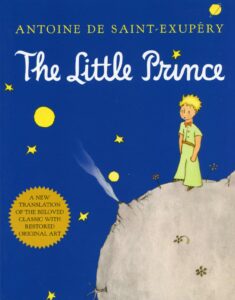
Book Summary
The Little Prince is a wonderful book written by Antoine de Saint-Exupéry. It tells the story of a little prince who travels from planet to planet, meeting different creatures and learning important life lessons along the way.
This book is full of adventure and imagination! The little prince meets a talking fox, a wise snake, and even a flower who becomes his friend. Each planet he visits teaches him something new about friendship, love, and the importance of seeing with your heart.
The Little Prince is not just a regular story, it has a deeper meaning. It teaches us about the importance of cherishing the things that are truly valuable in life, like friendship and love. The little prince learns that grown-ups often focus too much on unimportant things and forget what really matters. This book reminds us to always keep our hearts open and to appreciate the beauty of the world around us.
Antoine de Saint-Exupéry was a French writer and aviator. He wrote The Little Prince in 1943 while he was living in the United States during World War II. Saint-Exupéry was known for his adventurous spirit and love for flying, which is reflected in his writing. He believed in the power of imagination and the importance of seeing the world through a child’s eyes. The Little Prince is his most famous book and has been translated into many languages around the world.
“The Little Prince” is a timeless piece of literature penned by Antoine de Saint-Exupéry. Published in 1943, it is a novella that has been translated into more than 300 languages and dialects, making it one of the most translated books in the world. Despite its short length and seemingly simple plot, the book is a profound philosophical allegory that explores themes of loneliness, friendship, love, and loss.
“The Little Prince” is a story about a young prince who travels from planet to planet, meeting various inhabitants, each representing a different aspect of adult life. The story is narrated by a pilot stranded in the desert, who encounters the little prince and learns about his adventures. The book is a critique of the adult world through the innocent eyes of a child, highlighting the absurdities of our societal norms and values.
The beauty of “The Little Prince” lies in its simplicity. The language is straightforward, the characters are vivid, and the plot is engaging. Yet, beneath this simplicity lies a depth of meaning that resonates with readers of all ages. The book’s charm is further enhanced by Saint-Exupéry’s original watercolor illustrations, which add a layer of visual storytelling to the narrative.
“The Little Prince” is a philosophical tale that explores the complexities of life and human nature. The little prince’s journey from planet to planet serves as a metaphor for the journey of life, with each planet representing a different aspect of human existence. The book critiques the adult world’s obsession with materialism, power, and superficiality, contrasting it with the innocence, curiosity, and wisdom of the child.
The book’s most famous quote, “It is only with the heart that one can see rightly; what is essential is invisible to the eye,” encapsulates its central theme: the importance of looking beyond surface appearances to understand the true essence of things. This theme is echoed in the relationships the little prince forms with the fox and the rose, which teach him about love, friendship, and responsibility.
Antoine de Saint-Exupéry was a French writer and aviator born in 1900. He is best known for “The Little Prince,” but his other works, such as “Night Flight” and “Wind, Sand and Stars,” also reflect his love for aviation and his philosophical reflections on life. Saint-Exupéry’s writing is characterized by his poetic style and his exploration of themes like friendship, love, and the search for meaning in life.
Saint-Exupéry’s life was as adventurous as his stories. He was a pioneering aviator who flew for both commercial airlines and the French Air Force. His experiences as a pilot, including crashing in the Sahara desert, greatly influenced his writing. Saint-Exupéry disappeared during a reconnaissance mission in 1944, and his disappearance remains one of the enduring mysteries of the literary world.
In conclusion, “The Little Prince” is a profound and moving book that offers valuable insights into life and human nature. Its timeless wisdom and universal themes make it a must-read for readers of all ages.
Don Quixote by Miguel de Cervantes
Miguel de Cervantes
Read Now →